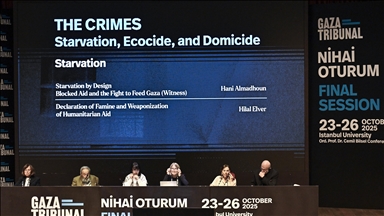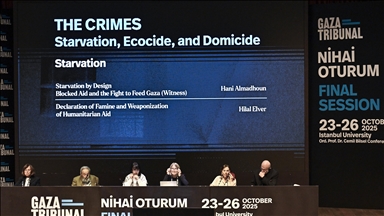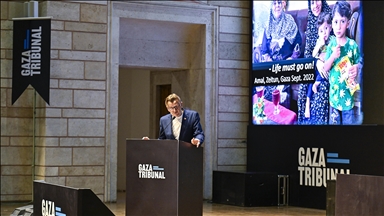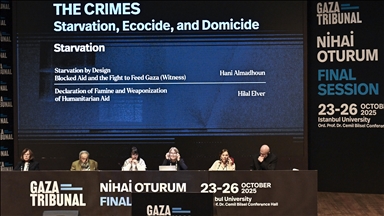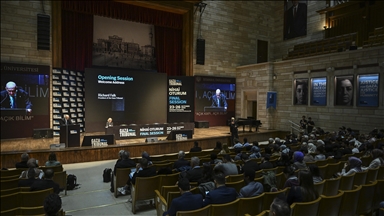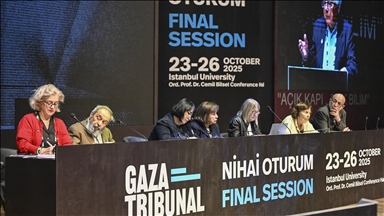Global voices demand justice for Palestinians at Gaza Tribunal in Istanbul
International activists, artists, authors stress genocide, ethnic cleansing, systemic violations in Gaza, calling for urgent accountability, comprehensive record of crimes
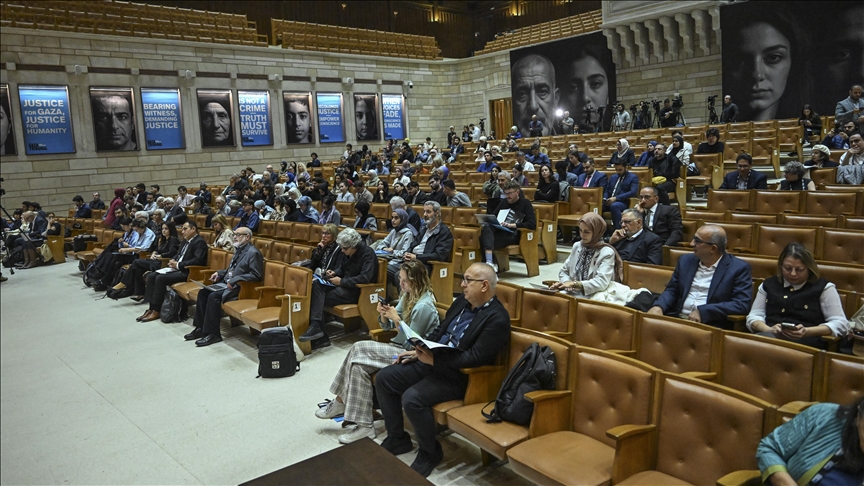
ISTANBUL
The opening of the Gaza Tribunal's final session, titled Welcome and Grounding, featured on Thursday a series of powerful statements from global figures, both in-person and remotely, emphasizing the urgent need for accountability and justice for Palestinians.
Raji Sourani, a Palestinian lawyer based in the Gaza Strip and the director of the Palestinian Centre for Human Rights, highlighted the unprecedented challenges facing international justice mechanism in addressing the Palestinian-Israeli conflict.
“I think what makes this talk unique and special is that ... for the first time, in an unprecedented way, the world justice system, the ICC (International Criminal Court), has been subject to unprecedented attack,” Sourani said, joining the session remotely.
“The current situation in Gaza, making genocide going on, making ethnic cleansing going on, without horizon, without agreement about anything in the Middle East, without agreement on having the Palestinian right of self-determination … it’s very hard to speak about peace,” he noted, describing the ongoing humanitarian crisis in Gaza.
“The word peace ... used as mirage, it's not reality, ... the Palestinian people can enjoy the peace when they achieve the right of self-determination,” Sourani concluded.
'Live-stream genocide of Palestinians'
Renowned Indian author Arundhati Roy contributed to the session through a written statement detailing the human toll of the conflict.
“Israel is in live-stream genocide of Palestinians. … It has killed almost 70,000 people who were part of the tiny encircled, occupied, and isolated population of Gaza. The final death toll will only be known once the thousands of tons of rubble has been cleared,” Roy noted.
She added that the US and European governments played a decisive role: “Certainly, the US could have stopped the killing in an afternoon. So the question is, whose genocide is it, and who should be held accountable?”
American actress Marcia Cross, via video, described the systematic destruction of Gaza and the failures of international institutions.
“Every day if you look at its entire families, people buried, children shot, isolated, forced to pick up the remains of their tiny bodies and put them into plastic bags. ... 85% of all Gaza has been decimated. Hospitals have been robbed and taken hostage. With the international community not needing or unwilling to stop it. The legal and political systems designed to protect life have failed,” she said.
Cross also stressed the tribunal’s role in documenting these crimes: “The Gaza Tribunal is that action. Organized conscience of a civil society, documenting, archiving, and exposing the crimes committed against the people of Gaza."
'We must keep on raising our voices'
US-based Islamic scholar and civil rights activist Omer Suleiman, also appearing via video, emphasized the importance of recording these events for posterity.
“The Palestinian people have suffered long enough, the people of Gaza have suffered long enough, but it's important that the story is preserved and told for generations to come. … I have no doubt that with inspired action with experts, with academics, with activists, with people of conscience and people of faith, that we will be able to achieve in our lifetime some of the most remarkable things that are necessary to reverse the course that the Palestinian people have been put on unfortunately through these acts of destruction and before genocide and apartheid.”
English musician and activist Roger Waters framed the tribunal as a moral imperative. “We must keep on raising our voices," he said, calling for global solidarity in confronting oppression.
Gaza Tribunal
The four-day public session, held at Istanbul University from Thursday through Sunday, marks the culmination of a year-long effort by international jurists, scholars, and civil society figures to document alleged crimes committed against Palestinians.
Thursday's session built on earlier hearings in Sarajevo and other global forums, consolidating findings across three chambers: International Law, International Relations and World Order, as well as History, Ethics, and Philosophy.
Presided over by Richard Falk, former UN special rapporteur on human rights in the Palestinian territories, the tribunal aims to produce a comprehensive “people’s record” of what participants describe as genocide, apartheid, and systemic violations of international law in Gaza.
Its jury of conscience includes Kenize Mourad, Christine Chinkin, Chandra Muzaffar, Ghada Karmi, Sami Al-Arian, and Biljana Vankovska.
Anadolu Agency website contains only a portion of the news stories offered to subscribers in the AA News Broadcasting System (HAS), and in summarized form. Please contact us for subscription options.


